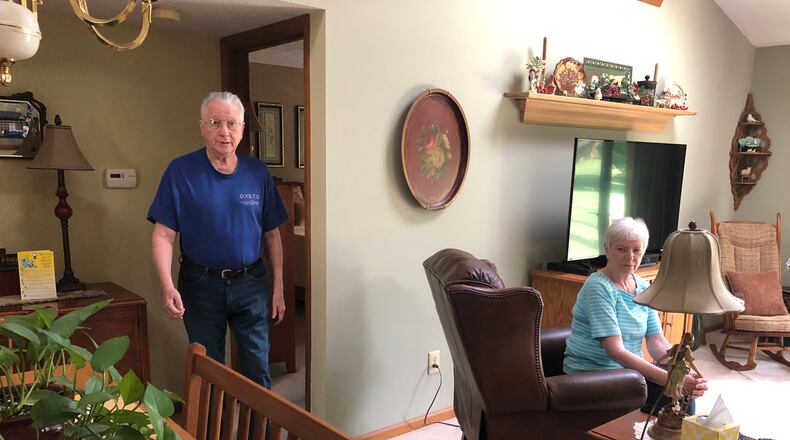He was nearly killed 67 years ago when he was struck on his bike by a car traveling 80 mph, and he recently was released from Atrium Medical Center after surviving the coronavirus.
“There is no question there is something the Lord intends for me to do,” Campbell, 75, said while sitting in his Lebanon home with his wife, Bev. “I’m not sure what that is, but I’m ready. Maybe I’m to be a witness to what the coronavirus has done and can do.”
He said his second “near-death experience” began in early March when he felt weak and unable to catch his breath. He worked part-time at an auto auction business in Franklin and there were days when he went home after a few hours.
“I was feeling not right, weak,” he said. “It got worse.”
His flu test came back negative.
“Still wasn’t feeling better and wasn’t getting better,” he said.
So his wife of 54 years called TriHealth, and a doctor answered. She told Campbell if it were her husband, she would take him to the hospital.
“I’m glad I talked to a woman,” Bev said.
A rescue squad transported Campbell to TriHealth Bethesda Arrow Springs in Lebanon on March 21, then he was moved to Bethesda North, where he spent five weeks. He was placed in a medically induced coma, took 15 medications daily, was frequently turned in bed and couldn’t see visitors.
He was on a ventilator for six weeks, and doctors determined his lung capacity was 60 to 70 percent and probably won’t improve. He remembers nothing about being in the hospital.
Once out of the intensive care unit, he was transferred to Good Samaritan Hospital in Cincinnati for two weeks.
Then in the middle of May, he was sent to Atrium Medical Center’s inpatient rehabilitation unit for several weeks for speech, physical and occupational therapies as part of his COVID-19 recovery.
His wife and their son, Scott, offered support throughout his hospital stays. He said it was “an inspiration” to see them after weeks alone in the hospital.
Campbell was released on June 1, what he called “a monumental day for me.”
As he was being discharged — with the theme music to “Rocky” playing over the sound system — Campbell made his way down the hall that was lined with hospital employees. Then when he reached the main lobby, there were more employees cheering his every move.
Campbell said seeing 50 to 70 Atrium employees lining the hallways all the way out to the main entrance and clapping for him was an experience that “will live with me until the day I die.”
“It broke me down,” he said. “I couldn’t take it. It was really something.”
His wife was getting the car and missed the discharge celebration.
“Would have cried like a baby,” she said.
Ed Bastien, director of spiritual care at Atrium, said the “victory lap” serves a dual purpose: Celebrates the patient’s recovery and allows the staff an opportunity to realize their hard work dealing with the coronavirus is paying off.
Bastien said he often thinks about a quote attributed to Neil Gaiman: “Fairy tales are more than true: not because they tell us that dragons exist, but because they tell us that dragons can be beaten.”
“This has been our dragon,” Bastien said of COVID-19. “When a patient is discharged we all feel a sense of victory.”
Campbell continues to get treatments twice a week at Atrium’s physical therapy location inside Countryside YMCA in Lebanon. The other five days, he walks inside his home. A complete circle through the kitchen, master bedroom and living room measures 66 feet. He makes enough laps that he’s walking three-fourths of a mile a day.
As he talked about his coronavirus recovery, he thought back to June 24, 1953, the day that nearly ended his life. He was 7 years old, five weeks shy of his eighth birthday without a care in the world. He was struck by a car on Ohio 63 and his handlebars punctured a hole in his liver. During emergency surgery at Grandview Hospital in Dayton, he flat lined, but survived.
“It changed my life,” he said.
He was talking about the coronavirus. He could have been talking about the crash.
Credit: Rick McCrabb
Credit: Rick McCrabb
About the Author


